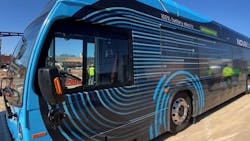WMATA’s updated transition plan to deliver zero-emission fleet three years faster
The Washington Metropolitan Area Transit Authority (WMATA) published its Zero-Emission Bus Transition Plan Thursday that will accelerate the adoption and integration of zero-emission vehicles and infrastructure into its fleet by 2042. The timeline to transition the 1,600-vehicle fleet to zero emissions is three years faster than the 2045 target included in the original fleet transition strategy approved by the WMATA Board in June 2021 .
The authority plans to have five of the nine garages needed to support a zero-emission fleet in operation by 2031. The Northern Bus Garage will be the first to open in 2027 with capacity to support 150 zero-emission buses. WMATA started construction on Northern Bus Garage in January and followed by Bladensburg Garage in early March. By 2033, a sixth garage will open and half of WMATA’s fleet is expected to be zero emission. The remaining three garages will open by 2041.
WMATA anticipates the lifecycle costs of transitioning to a fully zero-emission fleet through Fiscal Year 2055 to be $7.37 billion, which is $2.3 billion above what anticipated lifecycle costs of its internal combustion engine fleet would be through the same period.
The agency says it will “aggressively pursue funding” opportunities at the local, state and federal levels to support its planned zero-emission transition. WMATA is also exploring how to collaborate with neighboring agencies to reduce costs and duplicative efforts.
"We will continue to look for ways to further accelerate the transition to zero-emission buses, which provide customers with the same safe, reliable service at a much smaller carbon footprint," said WMATA General Manager and Chief Executive Officer Randy Clarke. "Every trip taken with Metro instead of a car reduces greenhouse gas emissions and transitioning to zero-emission buses will deliver additional environmental and health benefits while improving the quality of life for people across the region."
In addition to starting construction on the Northern and Bladensburg Garages, WMATA has taken steps to start its Electric Bus Test and Evaluation that will analyze 10 buses from two manufacturers. The authority awarded two contracts to procure these 10 battery-electric buses to New Flyer of America and Nova Bus. The companies will deliver five buses each in 2024.
WMATA explains it will initially deploy battery-electric buses, which is the more developed and cost-effective technology at this time, but will continue to evaluate hydrogen fuel cell technology as its commercial viability evolves.
About the Author

Mischa Wanek-Libman
Group Editorial Director
Mischa Wanek-Libman is director of communications with Transdev North America. She has more than 20 years of experience working in the transportation industry covering construction projects, engineering challenges, transit and rail operations and best practices.
Wanek-Libman has held top editorial positions at freight rail and public transportation business-to-business publications including as editor-in-chief and editorial director of Mass Transit from 2018-2024. She has been recognized for editorial excellence through her individual work, as well as for collaborative content.
She is an active member of the American Public Transportation Association's Marketing and Communications Committee and served 14 years as a Board Observer on the National Railroad Construction and Maintenance Association (NRC) Board of Directors.
She is a graduate of Drake University in Des Moines, Iowa, where she earned a Bachelor of Arts degree in Journalism and Mass Communication.

